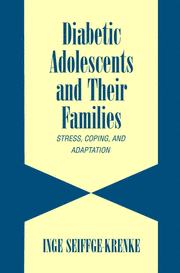Book contents
- Frontmatter
- Contents
- Foreword by Stuart T. Hauser
- Preface
- 1 Epidemiology of Chronic Illnesses in Adolescence
- 2 Coping with Illness in Adolescence: An Overview of Research from the Past 25 Years
- 3 Coping with Diabetes: A Longitudinal Study
- 4 Knowledge of the Illness, Compliance, and Patient–Physician Relationships
- 5 Self-Concept, Body Image, and Perceived Health
- 6 Adolescent, Parental, and Family Coping with Stressors
- 7 Chronic Illness and the Family: The Perspectives of Mothers, Fathers, and Siblings
- 8 Friendships, Romantic Relationships, School, and Career
- 9 Successful Adaptation or the Development of Psychopathology?
- 10 Pathways for Resolving the Dilemma between Developmental Progression and Adaptation to the Illness
- 11 Implications for Prevention and Intervention
- References
- Index
7 - Chronic Illness and the Family: The Perspectives of Mothers, Fathers, and Siblings
Published online by Cambridge University Press: 06 August 2009
- Frontmatter
- Contents
- Foreword by Stuart T. Hauser
- Preface
- 1 Epidemiology of Chronic Illnesses in Adolescence
- 2 Coping with Illness in Adolescence: An Overview of Research from the Past 25 Years
- 3 Coping with Diabetes: A Longitudinal Study
- 4 Knowledge of the Illness, Compliance, and Patient–Physician Relationships
- 5 Self-Concept, Body Image, and Perceived Health
- 6 Adolescent, Parental, and Family Coping with Stressors
- 7 Chronic Illness and the Family: The Perspectives of Mothers, Fathers, and Siblings
- 8 Friendships, Romantic Relationships, School, and Career
- 9 Successful Adaptation or the Development of Psychopathology?
- 10 Pathways for Resolving the Dilemma between Developmental Progression and Adaptation to the Illness
- 11 Implications for Prevention and Intervention
- References
- Index
Summary
The onset of a chronic illness confronts an adolescent with a situation that is highly stressful in various ways. Moreover, diagnosis and management of the illness present major long-term stressors for the parents as well (Eiser, 1985). Although some families are able to adjust to the illness by experimenting with new behaviors, other families are incapable of devising new strategies. They continue along familiar paths and rely on former methods of solving problems in order to meet the adolescent's new needs. Often one parent devotes the bulk of his or her time and energy to caring for the illadolescent, thereby withdrawing from the other members of the family, a pattern seen most commonly in mothers of chronically ill children and adolescents (Cook, 1984). In this respect, it is important to clarify the father's role in the family's coping and whether the relationship between the ill adolescent and other children in the family is affected. Open and concealed conflicts could arise in the family, and these may undermine treatment and impair the adolescent's metabolic adjustment. A fundamental question is how the chronicity of the stressors contributes to dysfunctional behaviors in the family. The stress of an illness could, in itself, possibly be coped with well, but its chronicity might lead to a rigidity or a breakdown of coping even in a family that initially functioned well (Canning, Hanser, Shade, & Boyce, 1993;Trute & Hauch, 1988).
- Type
- Chapter
- Information
- Diabetic Adolescents and their FamiliesStress, Coping, and Adaptation, pp. 118 - 165Publisher: Cambridge University PressPrint publication year: 2001



